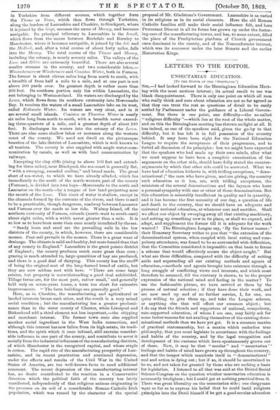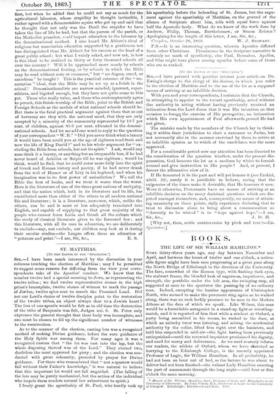LETTERS TO THE EDITOR.
UNSECTARIAN EDUCATION.
[TO THE EDITOR OF THE " SPECTATOR:1 SIRS I had looked forward to the Birmingham Education Meet- ing with the most anxious interest ; its actual result to me was blank disappointment. There is only one point on which all men who really think and care about education are not so far agreed as that they can treat the rest as questions of detail to be easily settled by Parliament under the guidance of a Liberal Govern- ment. But there is one point, one difficulty—the so-called "religious difficulty "—which lies at the root of the whole matter, and on this the Birmingham meeting has thrown no light at all. It has indeed, as one of the speakers said, given the go-by to that difficulty, but it has left it in full possession of the country behind. It may have been right for the National Education League to require the acceptance of their programme, and to forbid all discussion of its principles : but we might have expected that the speakers who had made up their own minds, after what we must suppose to have been a complete examination of the arguments on the other side, should have fully stated the counter- arguments by which that other aide could be answered. What we have had of education hitherto is, with trifling exceptions, " deno- minational ;" the men who have given, and are giving, the country such education as it has, are, with trifling exceptions, the ministers of the several denominations and the laymen who have a personal sympathy with one or other of those denominations. But this education is miserably insufficient in quality and in quantity, and it has become the first necessity of our day, a question of life and death to the country, that we should have an adequate and universal national education, at whatever cost and sacrifice. Shall we effect our object by sweeping away all that existing machinery, and setting up something new in its place, or shall we expand, and adapt, and supplement the former till it is adequate for the work wanted ? The Birmingham League say, ' By the former means : ' their Honorary Secretary writes to you that " the extension of the denominational system, when coupled with local rating and com- pulsory attendance, was found to be so surrounded with difficulties, that the Committee considered it impossible on that basis to frame a scheme that would effectively secure the object sought." But what are these difficulties, compared with the difficulty of setting aside and superseding all our existing methods and agents of education,—methods and agents brought into existence through a long struggle of conflicting views and interests, and which must therefore be assumed, till the contrary is shown, to be the proper expression of the national mind and feeling in the matter? To use the fashionable phrase, we have arrived at them by the process of natural selection ; if they have done their work, and are now used up and of no farther service, I, for one, am quite willing to give them up, and take the League scheme, or anything else that will effect our common object ; but I do say that the friends and supporters of national, compulsory, rate-supported education, of whom I am one, may fairly ask for some better reasons for not availing themselves of the existing deno- minational methods than we have yet got. It is a common maxim of practical statesmanship, but a maxim which embodies true philosophy, that you must legislate in accordance with the feelings and habits of the country, and by the legal recognition and development of the customs which have spontaneously grown out of these. Now, it may be that " secular" and " unsectarian " feelings and habits of mind have grown up throughout the country, and that the temper which manifests itself in " denominational " zeal and action is dying out ; but if so, it should be ascertained to be so, and not taken for granted by those who are seeking a basis for legislation. I listened to all that was said at the Bristol Social Science Congress on the question whether unsectarian education is necessarily irreligious ; but I could get at nothing practical from it. There was great liberality on the unsectarian side ; one clergyman went so far as to express his belief that he could instil religions principles into the Devil himself if he got a good secular education first, but when he added that he could not say as much for the agricultural labourer, whose stupidity he thought invincible, I rather agreed with a Somersetahire squire who got up and said that he thought that not only was the Devil the stupider to have taken the line of life he had, but that the parson of the parish, or the Methodist preacher, could impart education to the labourer by the denominational method. I also heard Mr. Abbott's ideal of religious but unsectarian education supported by a gentleman not less distinguished than Mr. Abbott for his success as the head of a great public school ; but what I vainly asked, and now ask, is how is this ideal to be realized in thirty or forty thousand schools all over the country? Will it be approached more nearly by schools on the denominational footing, or by schools in which the Bible may be read without note or comment," but " no dogma, creed, or catechism" be taught ? This is the practical outcome of the " un- sectarian " ideal, that the Bible may be set up as a fetish in the school ! Denominationalists are narrow-minded, ignorant, super- stitious, and bigoted enough, but they have not quite come to this yet. Those who really value, and those who contemptuously agree to permit, this fetish-worship of the Bible, point to the British and Foreign Schools as the models of what national schools should be. But there is the fatal practical argument against them that so out of harmony are they with the national mind, that they are only accepted by a minority of the community represented by 141 per cent. of children, against 85.3 per cent. educated in the denomi- national schools. And let me add one word in reply to the question of your correspondent "W. B." "Did you never think what a luxury it would have been could you at the age of eighteen read fresh and new the life of King David ?" and to his whole argument for " ex- cluding the Bible from schools, but not its spirit." I ask, would any man think it a luxury, or anything but an irreparable loss, if he had never heard of Achilles or Scipio till he was eighteen ; would he think, would he find, that he could enter more fully into the spirit of Greek and Roman history and poetry, if he had never drunk from the well of Homer or of Livy in his boyhood, and when his imagination was in its first power of assimilation ? We call the Bible the best of books, and we treat it worse than the worst. Here is the literature of one of the three great nations of antiquity, and that the nation which, both in its literature and its life, has contributed more than either of the others to all modern national life and literature ; it is a literature, moreover, which, unlike the others, can be and is more or less adequately translated into English, and capable of supplying to that great majority of the people who cannot learn Latin and Greek all the culture which the study of classical literature gives to the favoured few ; and this literature, with all its uses in education, we are deliberately to exclude—nay, not exclude, our children may look at it during their secular studies—the League offers them an education of
" potatoes and point."—I am, Sir, &c., E. S.































 Previous page
Previous page